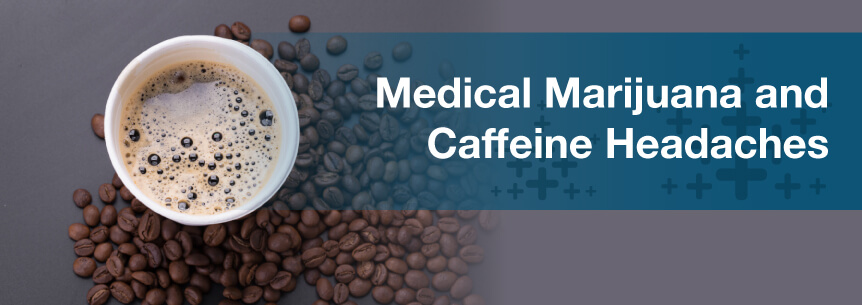
Many folks consider coffee and tea a crucial part of their lives. In fact, an American typically consumes 200-300 milligrams of caffeine a day, or about two to three cups of coffee. But it isn’t so much of a joke when your cup of joe makes your head hurt. Some people even suffer from chronic caffeine headaches!
Fortunately, patients dealing with headaches from all kinds of sources find relief in medical marijuana every day. In this guide, you will learn about topics like:
As the name implies, caffeine headaches are headaches resulting from a caffeine-related cause. For most people, a caffeine headache starts behind the eyes and spreads to the front of the forehead. These head pains can range from slightly painful pressure to a full-blown migraine.
Technically speaking, caffeine headaches count as a kind of rebound headache. Rebound headaches usually come from long-term painkiller use. Ironically enough, they most often happen to patients who use those painkillers to treat headaches in the first place. While we don’t always use caffeine to relieve headaches, caffeine headaches work as a withdrawal-related symptom like other rebound headaches.
Besides feeling pain and pressure in your head, caffeine headaches can cause a variety of related symptoms. The frequency and severity of your secondary symptoms depend on the nature of your headaches. For instance, if you deal with chronic caffeine-related migraines, you will have more related health problems than someone with milder headaches.
Dealing with chronic caffeine headaches can result in symptoms like:
It’s important to note some headache symptoms could come from another problem that requires immediate medical attention. If you experience the following kinds of headaches, see a doctor right away:
Some of these symptoms can indicate a serious problem like a stroke or brain tumor. If you have yellow or green nasal discharge and pressure near your eyes, you could also have a sinus infection.
Some people rely on caffeinated substances to treat headaches and migraines. Migraine medications even tend to have caffeine in them to enhance their effects. So, what’s the deal? Does caffeine cause or relieve headaches?
In reality, caffeine can do both. While it’s true the drug can treat headaches, consuming caffeine in certain ways causes them. This dual nature comes from caffeine’s vasoconstrictive properties. Vasoconstrictive substances narrow blood vessels, reducing blood flow.
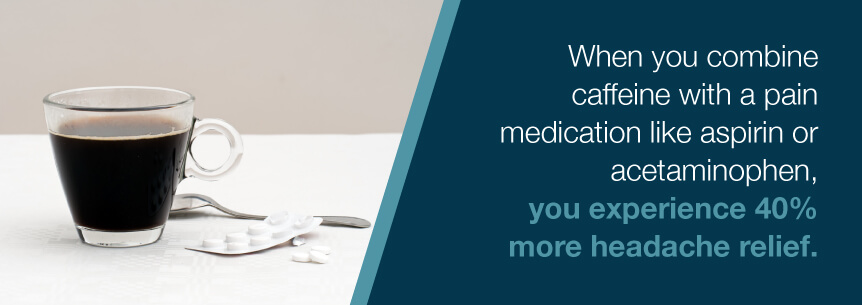
Caffeine has plenty of benefits that can make headaches more bearable. When you combine caffeine with a pain medication like aspirin or acetaminophen, you experience 40 percent more headache relief. People who have headaches resulting from inflammation can benefit from caffeine’s anti-inflammatory traits. It even works as one of the best treatments for hypnic headaches, which cause severe head pain for older patients.
But you can have too much of a good thing. The reasons behind caffeine headaches differ, but they often have to do with the blood vessels expanding again. Blood flows back to your vessels after your body gets used to less blood. Read on to the next section to learn more about why caffeine headaches happen.
Caffeine headaches happen when:
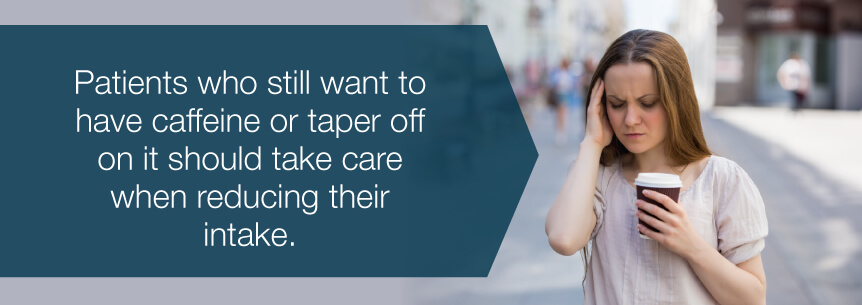
Monitor your caffeine intake carefully to figure out why you get headaches. You might be surprised!
You may have more caffeine every day than you think. While we usually think of coffee or energy drinks when we think of caffeine, you can find it in plenty more foods and beverages. Consider the average amounts found in the substances mentioned in this section.
Coffee drinks can have anywhere from two milligrams to 164 milligrams of caffeine in them. Contrary to its name, decaffeinated coffee has about two to five milligrams per five ounces, although it’s certainly not a very high amount. One ounce of espresso has around 30 to 50 milligrams, and five ounces of coffee can have 47 to 164 milligrams, depending on brewing method.
The caffeine content in tea depends on the type and brew time. Herbal tea usually doesn’t have any in it, making it ideal for any time of day. On the other hand, black, oolong and green tea can have as little as eight milligrams or as much as 110 milligrams. Iced black tea that comes in a can or bottle can have up to 76 milligrams per 12 ounces.
As you can imagine, energy drinks have some of the highest caffeine contents out of any food or beverage. Low numbers range from about 47 milligrams to 160 milligrams. High-caffeine energy drinks can have up to 500 milligrams of caffeine.
Caffeine sources we might not think about as often include soda and chocolate. Cola and other sodas can contain 36 to 57 milligrams in every 12 ounces. Chocolate products can range from six milligrams to 35 milligrams, with baking chocolate having the most. Some medications like diuretics and migraine pills can have as much as 200 milligrams!
You can address caffeine headaches like any other headache. Typical headache treatments include:
Medical marijuana works just as well as standard headache treatments, and with safer side effects. As you can see, the standard therapies listed above often have serious drawbacks or just aren’t feasible for some patients to use. Meanwhile, medical cannabis works as an effective pain reliever without any potential for long-term harm.
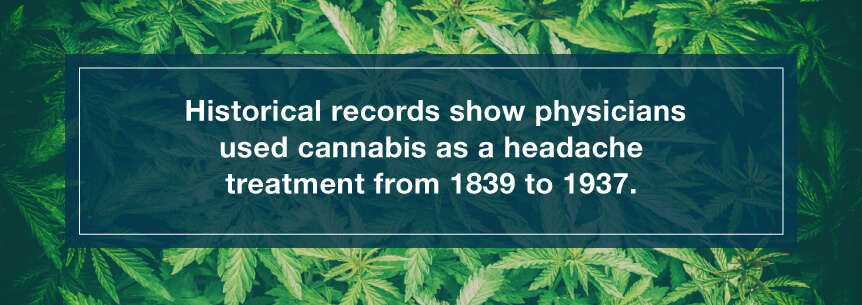
Feeling skeptical? Just ask people from the past. Historical records show physicians used cannabis as a headache treatment from 1839 to 1937. Not only do these documents mention mostly positive results, but some patients even experienced long-term relief after stopping medicinal marijuana.
Modern research supports cannabis’ ability to soothe headaches, too. Clinical studies have demonstrated the effectiveness of synthetic cannabinoids for headache treatment. But don’t count out natural cannabinoids — the marijuana plant’s compounds can help, too. Patients have plenty of anecdotal evidence that marijuana relieves their headaches, and clinical trials involving THC have resulted in promising data.
In fact, cannabis medicine excels at treating any kind of pain. Our bodies have a system that creates and processes cannabinoids called the endocannabinoid system. The endocannabinoid system influences all sorts of functions, including pain. When cannabinoid receptors take in certain compounds, they block pain signals, providing relief.
And when your headaches become severe, marijuana medicine can reduce secondary symptoms. In addition to relieving headaches, medical cannabis can treat symptoms like:
Experiencing headache relief is a wonderful feeling, but what if you could prevent your headaches in the first place? As we mentioned earlier, caffeine headaches often come from frequent or excessive caffeine use. If the patient could reduce their caffeine intake or get rid of it entirely, the headaches could stop happening. To successfully quit caffeine, a patient should think about why they use it in the first place.
The most straightforward answer to why most patients use caffeine? They’re tired. Many people feel they need caffeine to stay alert and face the demands of the day. As long as they don’t experience any negative effects from it, caffeine is harmless, but folks who get caffeine headaches may need to find an alternative.
Some patients have an underlying condition they don’t realize they’re trying to medicate with caffeine. For example, caffeine can work as an antidepressant that raises serotonin and dopamine levels. Some people may have depression and don’t know addressing it could solve their energy issues. And, of course, many other disorders can cause fatigue even when undiagnosed.
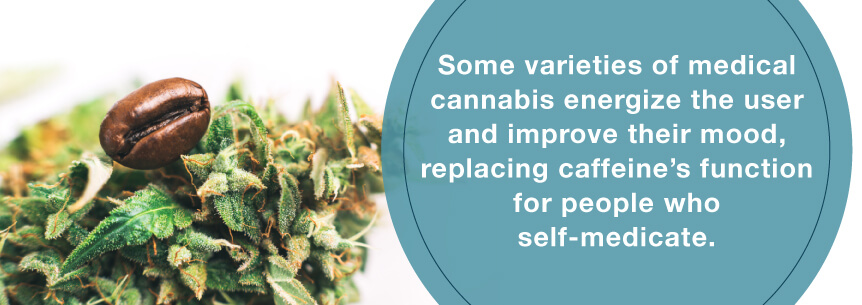
What if you could use medical marijuana to replace your self-medication with caffeine? Now, we aren’t saying you should light up a joint when you get up in the morning — any successful cannabis treatment plan involves balance. But some varieties of medical cannabis energize the user and improve their mood, replacing caffeine’s function for people who self-medicate.
When you plan your medical cannabis regimen, you have two important choices to make — strain and usage method. Marijuana medicine works as an incredibly versatile treatment. Instead of a bottle of one specific kind of medicine, think of medicinal cannabis as an entire medicine cabinet. By adjusting the way you use medical marijuana and the kind of product you take, you can relieve your symptoms effectively.
The type of strain that will work best for your caffeine headaches depends on the approach you want to take. Maybe you just want to treat the headaches themselves, or perhaps you need to stop self-medicating. You might have other symptoms that make your headaches worse. Consider the following strains:
Depending on your condition and symptoms, you could have a wider or narrower selection of medical marijuana products to take. Inhalation methods like smoking and vaping tend to kick in the fastest, so you can use them for sudden episodes. Edibles affect everyone differently, so you have to determine if they work well for you. Topical treatments impact a localized area, except in the case of patches, which release slowly into your bloodstream. You can also opt for an oil, tincture or capsule to ingest orally.
The perfect medication method will meet your individual needs, so we don’t have a universal answer for which one will treat caffeine headaches the most effectively. Instead, ask yourself the following questions:
Just like any other medicine, medicinal cannabis can cause side effects for some people. Fortunately, these adverse effects are less dangerous than those from other medications. Plus, they can’t harm you long-term — stop taking the medicine, and the side effects go away. Common side effects of marijuana medicine include:
If you do have side effects from your cannabis medication, you still have plenty of options. Many of these symptoms have easy fixes. You can also try another kind of medical marijuana product to counteract them. Finding the perfect treatment takes a little patience and experimentation.
Take control of your caffeine headaches. States that offer legal medical cannabis have plenty of professionals out there who can help you get started on the path to recovery. Search our doctor listings to find a cannabis-certified physician in your area. Once you have a medical cannabis card, you can visit a nearby dispensary to fill your recommendation.
Find A Doctor Find A Dispensary